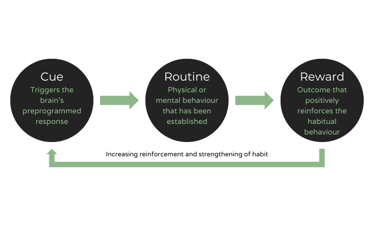Estudio español cada día
In 2011, I briefly lived in Argentina to undertake a dance program. As an Australian whose only exposure to a second language was Miss Sim's early secondary school Mandarin classes (into which I am ashamed to say I put minimal effort, to the point that I can now only count to three and politely request a 'white rabbit' sweet), I had no idea how to prepare myself to live in a largely non-english speaking country. I got by, with the help of a little local tutoring, although still feel that it was a slightly wasted opportunity to pick up more of the Spanish language.
Spurred by this regret, I started using a language app at the beginning of 2020. I knew that it wouldn't bring me anywhere near fluent, but it has been an important little daily brain flexing activity. One that I hope will support my desire to one day return to Latin America to immerse myself more fully and for longer.
At the time of writing this, I hold a 1,451 day streak on this app - meaning that I have practised at least once (usually twice) every day for nearly four years.
Far from a brag-fest (as I said, my actual fluency is embarrassing given the time investment), this is an example of sustainably building a small habit into each day - without fail - to support a larger goal. I know what it takes, and how tempting it can be to choose to do other things instead. I had to really consider how to structure this new habit into my day to achieve the commitment that I wanted.
What are habits?
In last month's article, I tackled identifying your 'why', goal setting and shrinking the change you want to see into bite-sized, everyday actions. The next step is to delve deeper into embedding these baby steps to the point that they become second nature.
Before delving into how to form or change habits, we must first understand what they actually are and what psychological processes underpin them. The overt behaviour, itself, is only one part of what is actually going on. Acknowledging this is important because the best way to either form a new habit or change an existing one is to hijack and leverage the underlying biological process - and create an environment around us in which our more desirable behaviours can thrive long-term.
In simple terms, a habit is any action that we do automatically, without thinking, in response to certain cues around or within us. They are ingrained in our brain through the cue-action-reward process. It looks like this:
Note that the cue in this process does is not necessarily obvious or grand. It can be as simple as sitting in a particular chair in your house, a certain time of day or a naturally occurring emotion. Whatever it is, it will trigger you to undertake a certain 'routine', which is the habitual behaviour itself.
The reward is also not always extravagant. It could be a sense of comfort, a temporary alleviation of boredom, an enjoyable taste, or anything else transiently gratifying that keeps you coming back for more. Think Dr Phil's frequent question: "What are you getting out of that?"
Why is changing habits so darn difficult?
Based on the above model, we can see that merely focusing on the behaviour we want to change on its own is ignoring the most compelling part of the process - the innate or unconscious component that is what actually makes the habit a habit.
When we change nothing else around the behaviour and rely solely on willpower alone we are setting ourselves up to fail - and do so very uncomfortably. In fact, there is such a thing as 'willpower fatigue', where the harder we try to white-knuckle a behavioural change the more we exhaust our energy stores and the less success we have in achieving our ultimate goal. Luckily, by instead placing more focus on the psychological reinforcement process that takes place as part of habit strengthening, we have a far greater chance of success.
I practice habits-based nutrition with clients because health behaviours are reinforced in just the same way as other behaviours. This means that one of the best ways to create new, lasting behaviours is to hijack our habit formation process and use it for good. By tapping into this innate system that is within all of us, we move from uncomfortable and unsustainable sheer grit willpower to new, intuitive ways of taking care of ourselves.
10 tips for developing new habits
Theoretically, this is all well and good, right? In practice, it takes thoughtful and consistent effort to train our brain and body to take the cue, perform a new, more desirable (healthier) habit and reinforce that behaviour through a perceived reward - ultimately all without thinking. It certainly won't happen overnight, but keep trying and you WILL get there - and you will sustain the new behaviour far better than relying on willpower. This is where a qualified practitioner can assist. We support people through this process all the time and can really help you navigate the associated challenges. In the meantime, here are some tips to get you started.
The first step is to identify the particular cue(s) that precede the behaviour your are trying to change. A habit diary can help with this - simply take note of what you were doing and thinking just before you got the urge to perform the habitual behaviour for a period of time until you see a pattern. If you are seeking to simply adopt a new habit, rather than change or replace an existing one, you need to clearly identify the new habit that you would like to adopt in order to achieve your bigger goals. This is where the change shrinking process helps.
Once you are clear on what you are trying to change or introduce, below are some practical tips on how to achieve long-term success:
Shrink the change from large health targets through to very small, tangible actions
This makes progress more achievable and builds confidence and motivation to make more changes to achieve your overall objectives. See my article on shrinking the change for a step-by-step guide on how to do this.
Consider replacing an unhealthy habit with a healthier behaviour
This mitigates the feeling that you have to add a whole new task to your day. It also alleviates the deprivation mindset that can come when you are trying to stop an unhealthy habit.
Use preparatory actions to further cue the behaviours you are reinforcing
The less excuses you can give yourself in advance the better. For example, pre-chop fruit and veggies and place your blender on the counter each night, ready for your morning smoothie.
Use a calendar to mark off each time you undertake your planned actions
There's nothing more satisfying than visually displaying a consistent record of effort! You can download my free Intrinsic Nutrition 30-day Habit Tracking Calendar for a simple template to use.
Piggyback/stack your new habit onto an existing one
Time the new behaviour just after an already established habitual behaviour for an increased likelihood of success. For example, you perform the new habit directly following brushing your teeth each morning.
Remember your 'why' - your emotional connection to adopting the habit
For example, you might think to yourself 'How will I feel if I am successful in adopting this new habit?', or 'How will this help me to achieve other important goals in my life?' You might like to write this down and review it daily as you build the habit.
Get support and build accountability
We tend to perform better when we know we are being observed by others. Write down your commitment to the new habit and consider who is/are the best person/people in your life to share it with to keep you accountable. Be clear with them about the best ways they can support you to achieve your goals.
Schedule the behaviour into your calendar
This will give your new habit the same visual and logistical weight as the other important things that you do. This might also include setting an alarm so that you don't forget, at least early on as you are developing the new habit.
Pre-plan healthy rewards
Decide what health-enhancing rewards you will use to celebrate your progress and successes. Decide on a timeframe after which you will treat yourself for a job well done. Some examples include a new piece of activewear for your workout sessions, kitchen appliance for healthy meal preparation, or simply an afternoon off life tasks with a good book and cup of herbal tea.
If you slip up, stay positive and on track
Simply acknowledge it and pick up your new behaviour when next planned. Always choose consistency and progress over perfection.
By following these tips and making consistent effort you'll be on your way to behaviours that support you to live your best life in no time!
Sources
Gardner, B. et al (2012) DOI: 10.3399/bjgp12X659466
Gardner, B. et al (2021) DOI: 10.1080/08870446.2021.2003362
https://www.psychologytoday.com/us/blog/the-truisms-wellness/201610/the-science-accomplishing-your-goals
Milyavskaya, M. & Inzlicht, M. (2017) DOI: 10.1177/1948550616679237
© Sharon Jenner 2023





